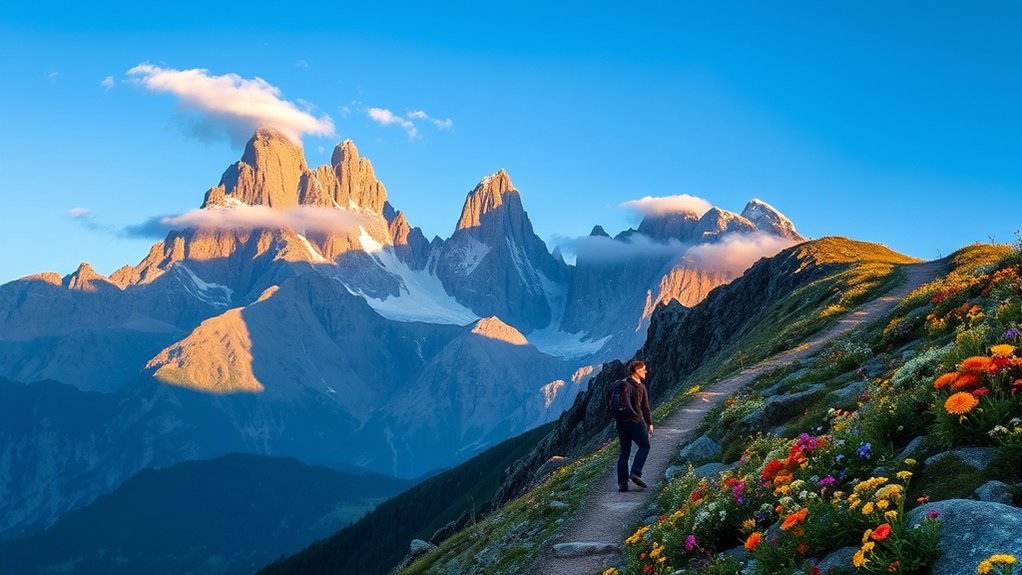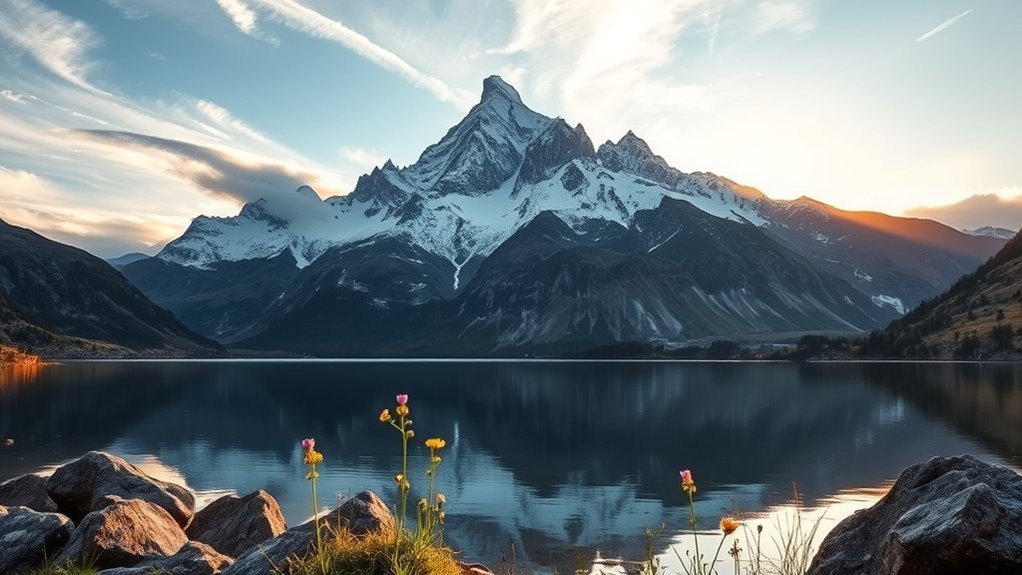Mountains are strong symbols of stability in a world full of changes. Their tall peaks show us beautiful sights and also offer a chance for spiritual growth. Climbing a mountain can remind you of facing the challenges in life. As you think about your climb, consider what lessons these mighty mountains can teach you about your own journey. This prompts us to explore how nature connects with our human experiences.
Key Takeaways
Mountains stand tall and strong. They give us a sense of stability in our lives, especially when things feel uncertain. Many cultures see mountains as special places that connect us to nature, almost like a bridge between the earth and the sky.
Climbing a mountain can be like a journey of personal growth. As we face challenges on our way up, we discover our own strength and resilience. It teaches us that we can overcome tough times.
In stories and myths, mountains are often where gods and goddesses live. This shows us that striving for wisdom and personal change is important.
Today, people view mountains as symbols of big dreams and peace. They inspire us to reach for our goals and keep moving forward in life. Mountains remind us that we can always aim higher and find our path to happiness.
The Mountain as a Symbol of Stability

Mountains are big and strong. They stand tall and give us a sense of stability in our lives. When you look at a mountain, you can feel its strength. It reminds us that there are things in life we can count on, even when everything else seems to change.
Mountains help us feel connected. They encourage us to find our own strength and build a solid foundation for ourselves and our communities.
Like mountains, we can learn to stand strong against life's challenges. We can hold on to our important values and find a place where we belong.
Spiritual Significance of Mountains Across Cultures
Throughout history, people all over the world have seen mountains as more than just big piles of rock. They think of mountains as special places that connect the earth with the sky. Many cultures respect these huge giants. They believe mountains are sacred landscapes that help people think deeply and feel connected.
For many, mountains are important on their spiritual journeys. They see them as homes for gods and as symbols that teach us about life. In places like the Andes and the Himalayas, people view mountains as gateways to something higher.
When you visit these mountains, you might feel closer to those who've found peace and understanding at the top. This can create a strong feeling of belonging and connection with others who share this experience.
The Journey of Ascent: Personal Growth and Transformation

Starting your journey to climb a mountain is like starting a journey inside yourself. Climbing takes hard work, but it shows you how strong and brave you can be.
As you move forward, you learn more about yourself. You face your fears and turn them into chances to grow.
Sometimes, you might doubt yourself, but reaching the top brings new clarity and purpose. Spending time in nature helps you feel connected to yourself and others on a similar journey.
Mountains in Mythology and Folklore
Many cultures see mountains as special places or homes for gods. These tall and mighty giants show up in stories from everywhere:
- Homes of Gods: Many people believe that powerful gods or spirits live in the mountains. They control the forces of nature.
- Heroic Climb: Stories of heroes climbing mountains often show a journey of personal growth. Climbing high can mean becoming stronger or wiser.
- Places of Wisdom: Mountains are also seen as places where people go to learn more about life and themselves. They connect the Earth with something greater.
Mountains aren't just beautiful to look at; they also carry deep meanings in people's lives.
The Intersection of Nature and Spirituality

Standing at the base of a tall mountain, you can feel a strong connection to nature and something deeper. The mountain stands tall and quiet, encouraging you to explore not just its beauty but also your own feelings.
As you look around and take in the sights, a calm feeling washes over you. This moment makes you want to understand more about yourself and the world.
Every gentle breeze feels like it's sharing a piece of wisdom. It's a chance to awaken your spirit and feel something bigger than everyday life.
You notice that your journey is about more than just climbing the mountain; it's about finding your place in life. The mountains show you how nature and spirituality are linked, guiding you to feel connected and at home.
Modern Interpretations of Mountain Symbolism
Mountains are amazing and still inspire many thoughts today. When you see mountains, think about how they mean:
- Strength: Mountains stand tall and strong. They remind us that we can be strong too, even when things get tough.
- Connection: In busy cities, tall mountains help us remember how powerful nature is. They make us feel like we belong to something bigger.
- Goals: Mountains also make us think about reaching our goals. They symbolize our hopes and wishes for success, both in life and spirit.
When you look at mountains during a busy day, they can make you wish for peace and calm. They remind us of our dreams and help us think about our own paths through life.
Psychological Implications of Climbing Mountains
Climbing a mountain can change how you feel and think. As you start your climb, you might feel scared or anxious. These feelings can bring up your biggest worries and doubts. It might seem hard to face these emotions, but doing so can also help you feel connected to yourself and to other climbers.
With each step you take, you learn more about yourself. You can turn your fear into energy that pushes you forward. When you finally reach the top, the beautiful view can be a sign that you have overcome your struggles. This moment helps you feel close to nature and to the friends who climbed with you.
Climbing isn't just about going up; it also means growing inside. You learn that being vulnerable is a sign of strength. You find comfort in knowing you're part of a community of climbers. Together, you share an adventure that brings everyone closer.
Inspirational Figures and Their Mountain Experiences
When you hear stories about people who've climbed mountains, you'll see that these adventures often change their lives.
Let's look at what these mountain climbers and spiritual guides teach us through their journeys:
- Personal Growth: Climbing mountains helps people face their fears and become stronger.
- Connection with Nature: Many find peace and understanding in beautiful landscapes. This helps them feel more aware of themselves and the world around them.
- Community and Inspiration: When they share their successes, they connect with others. This gives hope to those who are facing their own challenges.
Each time someone climbs a mountain, it shows a journey of change. You can discover your own strength by looking at their stories.
Whether their adventures inspire you to climb a mountain or help you deal with life's challenges, these figures show that mountains mean more than just being high. They represent the spirit of never giving up and coming together.
Frequently Asked Questions
How Do Mountains Influence Climate and Weather Patterns?
Mountains change the climate in many ways. They create different weather zones based on how high they are. As you go up a mountain, you will notice how the weather changes. This affects the plants and animals that live there, as well as the people in the areas below.
When air moves up a mountain, it cools down. This can lead to rain on one side of the mountain. The other side may stay dry. This difference creates unique places for plants and animals to thrive. For example, you might find lush forests on one side and a desert on the other.
Mountains also affect winds. They can block strong winds, making the air calm in some places. This helps people and animals live comfortably. Understanding how mountains work can help us learn more about our environment and how to take care of it.
What Physical Challenges Do Climbers Face on Mountain Expeditions?
When you go on a mountain expedition, you have to deal with some tough problems. First, there's altitude sickness. This happens when you climb too high too fast. It can make you feel dizzy or sick.
Next, the weather can change quickly. One minute it's sunny, and the next it could be snowing. You need to be ready for anything.
Also, finding your way is very important. You need to know how to read a map and use a compass.
Finally, having the right gear is key. Good shoes, warm clothes, and the right tools can really help you succeed on your climb.
Are There Health Benefits to Spending Time in Mountainous Regions?
Spending time in mountainous areas can be great for your health. When you visit these places, you get to enjoy nature, which can help you feel less stressed and think more clearly. The peaceful scenery makes you feel connected to nature and the world around you.
Being in the mountains also encourages physical activity. You can hike, walk, or explore, which keeps your body moving. This exercise is good for your heart and muscles. Plus, fresh mountain air can boost your mood and energy.
How Have Mountains Been Depicted in Art and Literature?
Mountains inspire many artists and writers. They show up in paintings as big, beautiful shapes. In stories, mountains can represent challenges or help characters grow.
When artists paint mountains, they often make them look grand and powerful. The colors and styles can make us feel awe or peace.
In literature, mountains can be tough obstacles for characters. Climbing a mountain can be a journey of personal growth. It's a way for characters to discover who they are or find meaning in their lives.
What Conservation Efforts Are in Place for Mountain Ecosystems?
Mountain ecosystems need our help to stay healthy. To protect these beautiful places, we use simple strategies.
One way is to create protected areas where plants and animals can thrive without harm. This keeps them safe from pollution and development.
Another important method is promoting sustainable tourism. This means people can visit mountains, but in a way that does not hurt the environment. Tourists learn to respect nature and follow rules that protect the area.
Local communities also play a big role. When we involve them in education and restoration work, they feel proud and connected to their land. This teamwork helps everyone care for these amazing places today and for the future.
Together, we can make sure mountain ecosystems remain vibrant and beautiful for generations to come!

Hello, I’m Zephyra, your guide at SpiritualityEssence.com. I’m passionate about uncovering life’s mysteries and sharing transformative insights. Let’s explore mindfulness, ancient rituals, and the path to a more awakened life together. Join me on this spiritual journey!

















